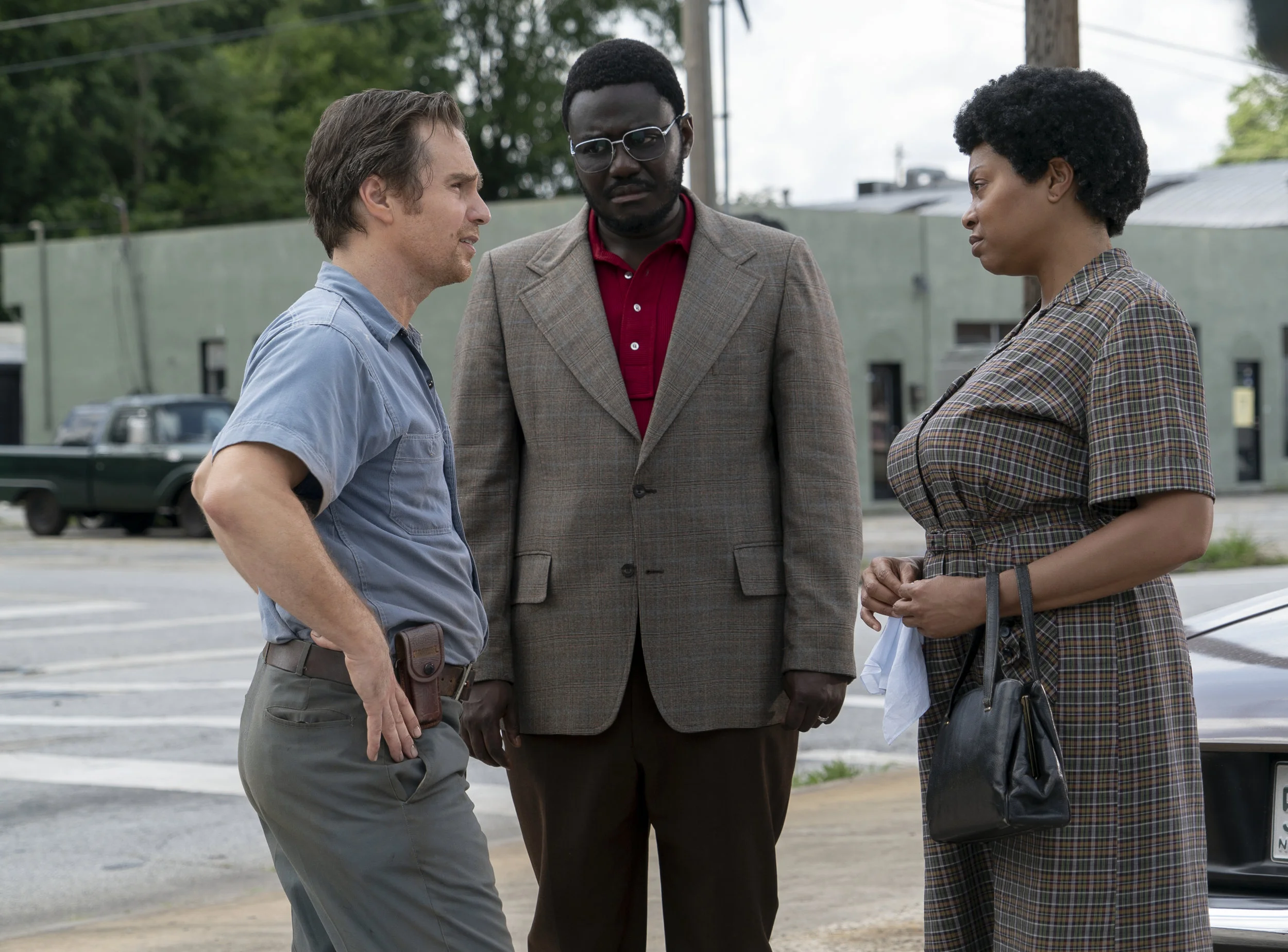The Best of Enemies: TV movie-ish tale of how a Klan leader's heart grew three sizes one day
By Jim Slotek
Rating: C
It’s ironic that Sam Rockwell is showing up this week playing a real-life KKK leader who changed his mind about Black people, given that a few years ago he was taking heat for playing a fictional racist who didn’t.
People who had problems with Three Billboards Outside Ebbing, Missouri usually listed the brutal racist hick deputy Rockwell played, whose character arc was one of redemption, though he still didn’t loudly denounce racism by the story’s end.
Babou Ceesay attempts a little New Age negotiation with Klan boss Rockwell and Civil Rights leader Henson
I suppose real-life is harder to film, because the much lesser film, The Best of Enemies, is an inspiring story told uninspiringly (almost like a TV movie), and with a prosaic grasp on the dynamics of how people change. It’s the story of Ann Atwater (an awkwardly padded Taraji P. Henson), a single mom and civil rights activist in Durham, N.C. in the ‘70s, and C.P. Ellis (Rockwell), Grand Cyclops of the Durham chapter of the KKK. Thrown together reluctantly and indignantly onto a committee to reconcile desegregating the district’s schools, they somehow ended up lifelong friends.
How you get a Klan leader’s heart to grow three sizes is a pretty tall order that The Best of Enemies does in the most expedient and predictable ways possible. Making it mostly C.P.’s story also gives short shrift to the actual African-American victims of his hate, who are asked to accept his conversion without hard feelings. He even gets to make a heart-warming speech about how we’re all the same as the city’s Black citizens look on in admiration.
The movie opens with a hate crime, a young White woman’s house pelted with rifle bullets for the offence of dating a Black man. Meanwhile, the activist named “Roughhouse Annie” is getting nowhere at City Hall with her litany of complaints of code violations and gouging by the landlord of a predominantly Black public housing project. Small wonder, as we discover that the town council, and the police, are either actual Klan members or in its pocket.
Following C.P. around, we discover that as lowbrow and vulgar as he is, his followers are an even bigger bunch of dimwits who feed on their own organization’s high-toned talk of brotherhood and hang out in bars or at the gun range. Still, C.P.’s right hand man, Floyd (Wes Bentley stands out for pure mean-spiritedness, and owns the baleful eye that will stand watch over his change of heart.
The straw that stirs this drink is a fire at the only Black public school in town, one that leaves the students looking for new classroom space and the constitutional right to it. City Hall says no, of course, but the courts say yes. The fact is, Durham schools would have segregated anyway by decree in this circumstance, but undoubtedly there’d be violence involved.
Instead, a Black community organizer and negotiator (Babou Ceesay) is brought in from outside to reconcile the two sides.
His solution: a series of community meetings aimed at finding common ground, and resulting in a “Senate” of 12 locals, six White and six Black, to consider testimony. The idea is that close contact will change minds, an idea out of step with where many people are today (but which lives on in Hollywood in movies like The Green Book). Still, it worked then. And it’s not like anybody’s offering any other solutions these days.
It helps that C.P. is apparently, under all those N-bombs, the only man in the Klan with a heart. He has a wife (Anne Heche) who loves him despite his hate, two kids at home, and a third, with Down Syndrome, in an institution, where he visits nearly every day.
When Ann pulls strings with the “colored” staff to get C.P.’s son better care, it enrages him, but not really. Whereas the other Klan executives originally see C.P.’s civil involvement as a chance to get to “know your enemy,” they quickly become concerned that he’s being compromised.
The “beats” in the story where hearts are supposed to swell are so telegraphed as to render The Best of Enemies emotionally flat. There are no surprises, no change-ups, no setbacks in this collision of sensibilities. And there’s a baffling soundtrack of supposed period songs including Hurdy Gurdy Man by Donovan, Blue Bayou by Roy Orbison and a cover of Tony Orlando’s Knock Three Times that add nothing to the story or mood.
The Best of Enemies. Written and directed by Robin Bissell. Starring Sam Rockwell, Taraji P. Henson and Babou Ceesay. Opens Friday, April 12 in Toronto, Vancouver and Montreal

